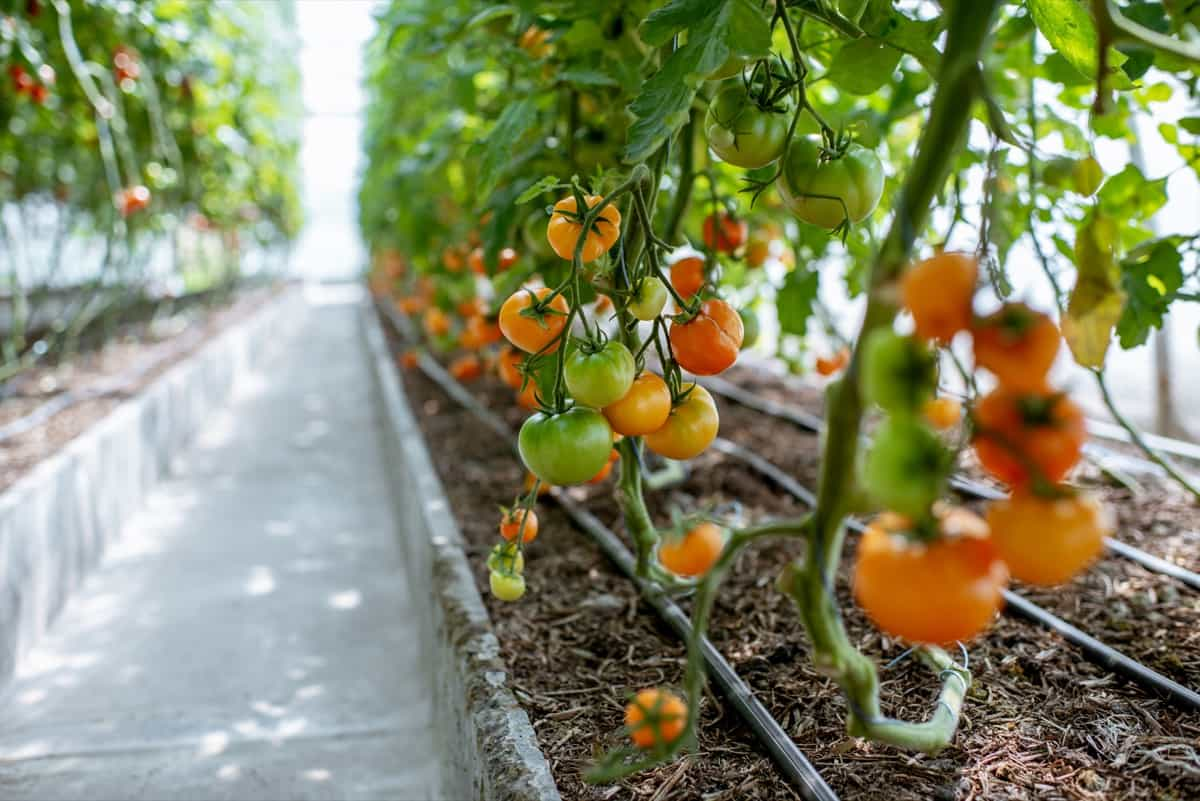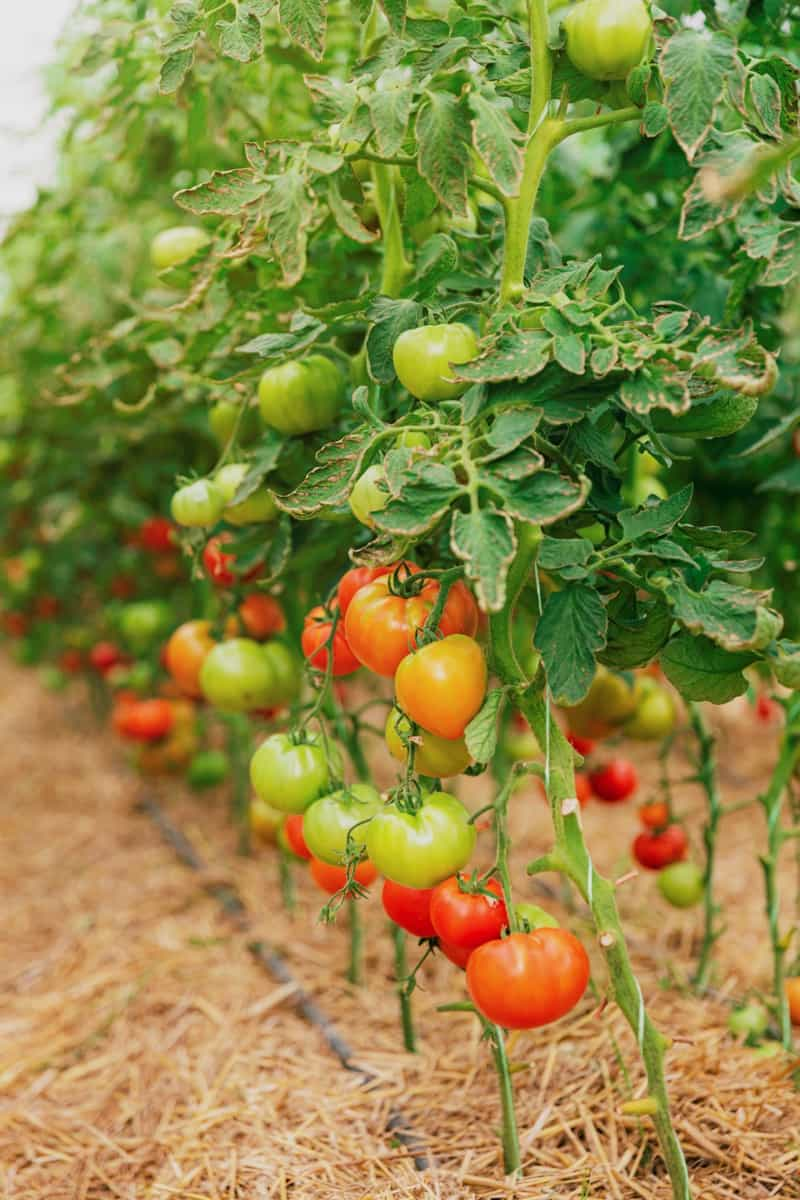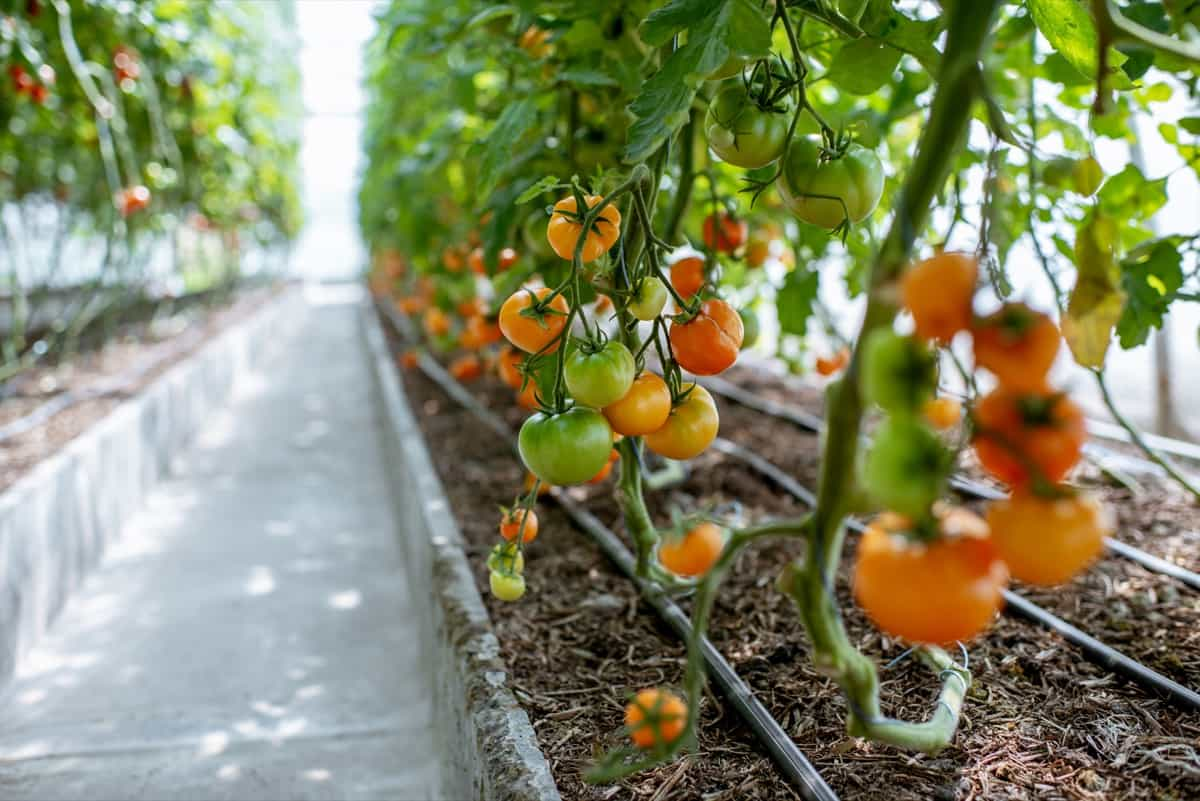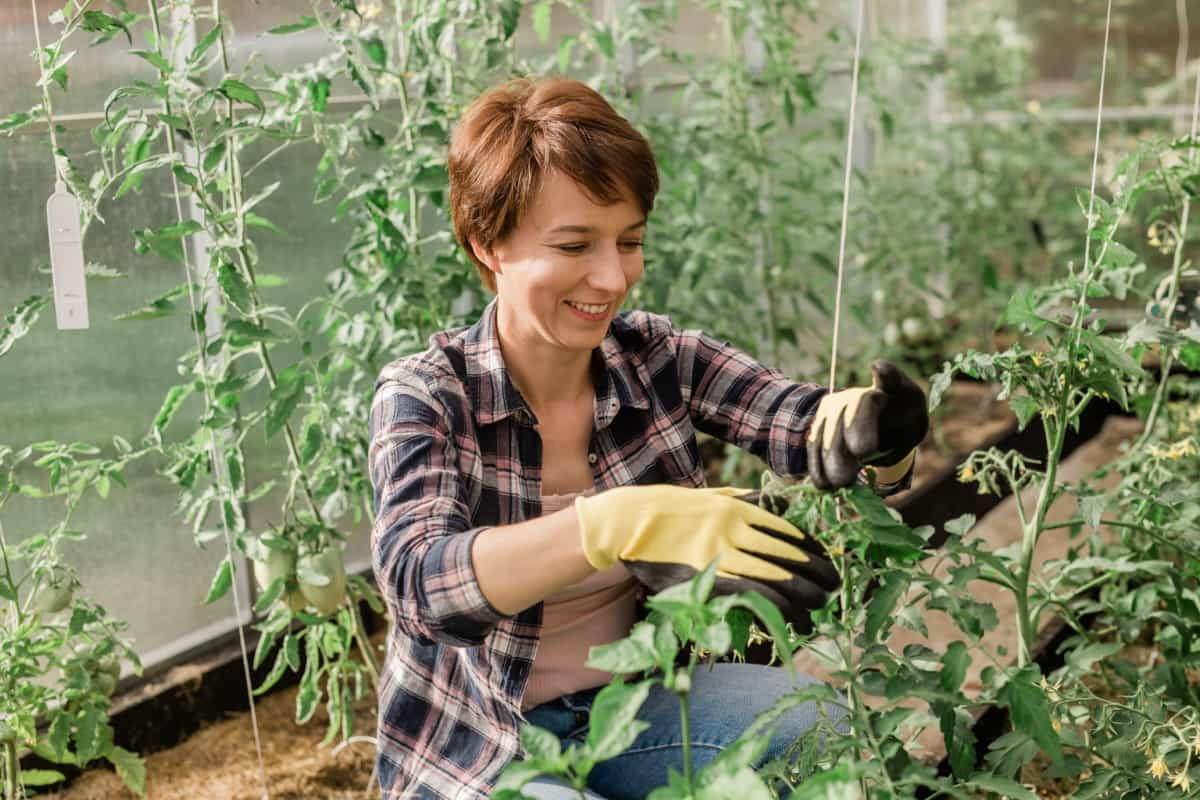Tomato farming thrives when modern, effective practices are employed, with mulching standing out as a notably impactful technique. Implementing mulch in tomato farming enhances soil health, controls weeds, conserves water, and improves the yield and quality of the tomatoes.

Tomato Farming with Mulch
What is Mulch, and Why is it Important for Tomato Farming?
The effect of mulching in tomato farming is profound as it helps conserve soil moisture, regulate soil temperature, and prevent weed growth. Choosing the best mulch for tomatoes in pots or gardens is crucial. Materials like straw, newspaper, and cardboard can be used as mulch, but knowing the best mulch to put around tomato plants is essential for optimum results. Some gardeners prefer mulching tomato plants with newspaper or using cardboard mulch for tomatoes, while others might opt for straw mulch.
Right Mulch Material for Tomato Farming: Types of Mulch for Tomato Plants
Several mulches can be used in tomato farming, each having unique benefits. Straw mulch for tomatoes is quite popular due to its ability to retain moisture and prevent weeds. It is often considered the best mulch for tomatoes in pots due to its lightweight and easy-to-manage nature.
Another innovative mulching method is using newspapers. Covering tomato plants with newspaper is a cheap way to stop weeds and moisten the soil. Cardboard mulch for tomatoes is also gaining popularity. It is a thicker option, providing a robust barrier against weeds and helping retain moisture.
In case you missed it: Tomato Farming with Cover Crops: How to Use Legumes for Better Soil Health and Yield

Instructions to Apply Mulch in Tomato Plants
Applying mulch on tomato plants is a simple process but must be done carefully. Begin by preparing the soil around the tomato plants, ensuring it is moist and weeds-free. Lay down the chosen mulch material, such as straw, newspaper, or cardboard, around the base of the tomato plants.
When mulching tomato plants with newspaper or any other material, ensure that the mulch is applied evenly and at a thickness that prevents weed growth and maintains soil moisture. It’s essential to avoid piling mulch directly against the tomato stems to prevent potential diseases or pest issues.
Major Benefits of Mulching for Tomato Plants
Mulching substantially benefits tomato plants, directly influencing their health and productivity. One of the major effects of mulching in tomato farming is improved water retention in the soil. The mulch stops water from disappearing fast from the soil, so the plants stay wet. Moreover, mulch acts as a protective layer that reduces the impact of heavy rains on the soil, preventing soil erosion and dirt splashing onto the plants.
Using Mulch to Control Weeds in Tomato Farming
Mulch is an excellent ally in the war against weeds in tomato farming. Its application around the base of tomato plants creates a barrier that makes it difficult for weeds to sprout and grow. Using mulch in tomato farming is important because it helps keep the tomato plants healthy and productive by reducing competition for nutrients and water. For example, using cardboard mulch for tomatoes effectively suppresses weed growth, providing a clean and manageable growing environment.
Using Mulch to Improve Soil Fertility in Tomato Farming
Mulch plays a significant role in enhancing soil fertility in tomato farming. Organic mulches, such as straw, gradually decompose, adding valuable organic matter to the soil. Adding organic materials improves the soil structure, enriching it and promoting a healthy microbial environment. The process, in turn, fosters the robust growth and development of tomato plants, ensuring that they receive ample nutrients for healthy and productive growth.
Using Mulch to Regulate Soil Temperature in Tomato Farming
Another crucial role of mulch in tomato farming is its ability to regulate soil temperature. Mulch helps by keeping the soil cooler in hot weather and warmer when it’s cold. This regulation of soil temperature creates a more stable environment for the roots of the tomato plants, promoting healthier growth and development.
For instance, straw mulch for tomatoes effectively maintains a consistent soil temperature, ensures that the plants are not stressed due to fluctuating temperatures, and can focus their energy on growth and fruit production.
In case you missed it: Summer Tomato Farming: Instructions to Grow Tomatoes in the Hottest Months

Using Mulch to Reduce Soil Erosion in Tomato Farming
Utilizing mulch in tomato farming is a potent strategy for combating soil erosion. Covering the soil surface with mulch, whether straw, newspaper, or cardboard, protects the soil from being washed away by heavy rains or strong winds.
This creates a more stable environment, maintaining the integrity of the soil structure and preserving essential nutrients that the tomato plants need for growth. The mulch also helps absorb the impact of raindrops, which reduces the risk of soil compaction and promotes better water infiltration, further assisting in the prevention of erosion and ensuring a healthy growing environment for tomatoes.
Using Mulch to Promote Healthy Root Growth in Tomato Plants
Mulch significantly contributes to fostering healthy root growth in tomato plants. By regulating soil temperature and retaining moisture, mulch creates an ideal environment for roots to thrive. A consistent and moderate temperature helps maintain a steady rate of root development, and the consistent moisture ensures that roots can absorb the necessary water and nutrients efficiently. Such favorable conditions encourage the roots to spread and grow deeply, creating a strong foundation for the plants.
Using Mulch to Enhance Tomato Yields in Farming
One of the ultimate goals of tomato farming with mulch is to enhance the yields, and mulch proves to be a substantial ally in achieving this. It plays multiple roles – from weed control and temperature regulation to moisture retention and promoting healthy root growth, all contributing to improved plant health and increased fruit production. Mulch ensures that the plants have an optimal environment to focus energy on growth and fruit production rather than combating stress from weeds, harsh weather, or inconsistent water availability.
Frequently Asked Questions (FAQ) on Tomato Farming with Mulch
Is Mulch Good for Tomato Plants?
Yes, mulch benefits tomato plants as it helps maintain soil moisture, regulate soil temperature, control weeds, and improve soil fertility. All these things together make tomatoes grow well.
What Kind of Mulch is Best for Tomatoes?
Straw, newspaper, and cardboard are among the best types of mulch for tomatoes. These materials effectively retain soil moisture, prevent weed growth, and maintain an even soil temperature, enhancing tomato plants’ overall health and productivity.
In case you missed it: How to Grow Tomatoes from a Tomato in 10 Simple and Easy Steps

What Color Mulch is Best for Tomatoes?
Tomatoes often prefer red or black mulch, as these colors can help warm the soil in cooler climates. However, the choice of mulch color should be based on the specific temperature and climatic conditions of the area where the tomatoes are being grown.
Conclusion
Implementing mulching in tomato farming is a transformative practice that fosters a healthy growing environment, promoting the vitality and productivity of tomato plants.
- Feed Your Flock for Less: Top 10 Tips to Save on Chicken Feed
- Ultimate Guide to Ossabaw Island Hog: Breeding, Raising, Diet, and Care
- Hatching Answers: The Top 10 Reasons Your Chickens Aren’t Laying Eggs
- Eggs and Economics: Breaking Down the Cost of Raising Backyard Chickens
- Defend Your Greens: Proven Methods to Keep Iguanas Out of Your Garden
- Ultimate Guide to Cinnamon Queen Chicken: A Comprehensive Guide for Beginners
- Ultimate Guide to California Tan Chicken: Breeding, Raising, Diet, Egg-Production and Care
- Ultimate Guide to Marsh Daisy Chicken: Breeding, Raising, Diet, and Care
- 10 Types of Chicken Farming Businesses You Can Start for Profits